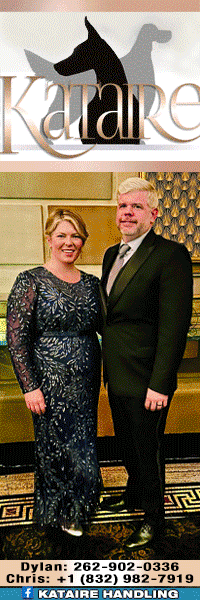Penn Vet Recruiting Dogs for Bone Cancer Vaccine Clinical Trial
 Sixty percent of dogs with osteosarcoma, an aggressive bone cancer, die within one year of diagnosis. But thanks to groundbreaking cancer immunotherapy trials, Dr. Nicola Mason of the University of Pennsylvania School of Veterinary Medicine (Penn Vet) has helped to prevent metastatic disease and prolong overall survival of dogs suffering with this devastating disease. Because there is a marked similarity at the molecular level in tumors of dogs and humans, the results of these clinical trials offer hope to humans with cancer, including children with osteosarcoma and women with breast cancer.
Sixty percent of dogs with osteosarcoma, an aggressive bone cancer, die within one year of diagnosis. But thanks to groundbreaking cancer immunotherapy trials, Dr. Nicola Mason of the University of Pennsylvania School of Veterinary Medicine (Penn Vet) has helped to prevent metastatic disease and prolong overall survival of dogs suffering with this devastating disease. Because there is a marked similarity at the molecular level in tumors of dogs and humans, the results of these clinical trials offer hope to humans with cancer, including children with osteosarcoma and women with breast cancer.
Dr. Mason is currently recruiting patients for a new trial for dogs with early osteosarcoma that have not undergone limb amputation. The purpose of this study is to evaluate whether vaccination with a tumor-targeting cancer vaccine, combined with radiation therapy, can decrease bone cancer pain and prolong overall survival in dogs with osteosarcoma. By harnessing the power of the immune system, Dr. Mason hopes to be able to specifically target and kill malignant cells. This may translate into decreased bone pain and increased overall survival in dogs that have not undergone amputation for the treatment of osteosarcoma. Pet owners interested in enrolling a dog in this study should contact Dr. Mason at nmason@vet.upenn.edu or 215-898-3996. Eligibility and trial details can be found here.
Denali, a 10-year-old Italian Spinone, was the first dog enrolled in this trial. Denali suffered a fracture of his right front humerus due to an osteosarcoma tumor. Since early January, he has received a vaccine every three weeks. His most recent radiographs and tests reveal that the cancer has not spread to the lungs or lymphatic system, and that his pathological fracture has since healed. Denali’s quality of life has been very good while receiving the vaccines. He walks 16 blocks a day, runs on the beach, and is back to work as a therapy dog in Brooklyn, NY.
In addition to Denali’s promising results, Dr. Mason has had remarkable success treating osteosarcoma in dogs that have undergone amputation and chemotherapy. Of the first five dogs vaccinated in a previous clinical trial, four have survived over two years since diagnosis and three of these dogs remain completely tumor-free. For more information, visit www.vet.upenn.edu/research/centers-initiatives/canine-cancer-studies.
Short URL: http://caninechronicle.com/?p=50325
Comments are closed











